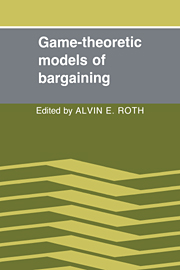Book contents
- Frontmatter
- Contents
- List of contributors
- Preface
- Chapter 1 Editor's introduction and overview
- Chapter 2 Disagreement in bargaining: Models with incomplete information
- Chapter 3 Reputations in games and markets
- Chapter 4 An approach to some noncooperative game situations with special attention to bargaining
- Chapter 5 Infinite-horizon models of bargaining with one-sided incomplete information
- Chapter 6 Choice of conjectures in a bargaining game with incomplete information
- Chapter 7 Analysis of two bargaining problems with incomplete information
- Chapter 8 Sequential bargaining mechanisms
- Chapter 9 The role of risk aversion in a simple bargaining model
- Chapter 10 Risk sensitivity and related properties for bargaining solutions
- Chapter 11 Axiomatic theory of bargaining with a variable population: A survey of recent results
- Chapter 12 Toward a focal-point theory of bargaining
- Chapter 13 Bargaining and coalitions
- Chapter 14 Axiomatic approaches to coalitional bargaining
- Chapter 15 A comment on the Coase theorem
- Chapter 16 Disclosure of evidence and resolution of disputes: Who should bear the burden of proof?
- Chapter 17 The role of arbitration and the theory of incentives
Chapter 2 - Disagreement in bargaining: Models with incomplete information
Published online by Cambridge University Press: 23 September 2009
- Frontmatter
- Contents
- List of contributors
- Preface
- Chapter 1 Editor's introduction and overview
- Chapter 2 Disagreement in bargaining: Models with incomplete information
- Chapter 3 Reputations in games and markets
- Chapter 4 An approach to some noncooperative game situations with special attention to bargaining
- Chapter 5 Infinite-horizon models of bargaining with one-sided incomplete information
- Chapter 6 Choice of conjectures in a bargaining game with incomplete information
- Chapter 7 Analysis of two bargaining problems with incomplete information
- Chapter 8 Sequential bargaining mechanisms
- Chapter 9 The role of risk aversion in a simple bargaining model
- Chapter 10 Risk sensitivity and related properties for bargaining solutions
- Chapter 11 Axiomatic theory of bargaining with a variable population: A survey of recent results
- Chapter 12 Toward a focal-point theory of bargaining
- Chapter 13 Bargaining and coalitions
- Chapter 14 Axiomatic approaches to coalitional bargaining
- Chapter 15 A comment on the Coase theorem
- Chapter 16 Disclosure of evidence and resolution of disputes: Who should bear the burden of proof?
- Chapter 17 The role of arbitration and the theory of incentives
Summary
Introduction
This essay serves as an introduction to recent work on noncooperative game-theoretic models of two-player bargaining under incomplete information. The objective is to discuss some of the problems that motivated formulation of these models, as well as cover some of the issues that still need to be addressed. I have not set out to provide a detailed survey of all the existing models, and I have therefore discussed only certain specific aspects of the models that I believe to be especially important. The reader will find here, however, a guide to the relevant literature.
The title of this chapter was chosen to emphasize the phenomenon of disagreement in bargaining, which occurs almost as a natural consequence of rational behavior (i.e., equilibrium behavior) in some of these models and is difficult to explain on the basis of equilibrium behavior using the established framework of bargaining under complete information. Disagreement, of course, is only one reflection of the problem of inefficient bargaining processes. I also spend some time on the general question of efficiency and its attainment. Whereas in most models classical Pareto-efficiency is not attainable in equilibrium, it may be obtained by players who deviate from equilibrium, as will be shown.
The chapter is organized as follows. Section 2.2 lays out the problem and discusses the important modeling approaches available. Section 2.3 focuses on a particular group of models, each of which specifies a strategic (i.e., extensive) form of the bargaining process.
- Type
- Chapter
- Information
- Game-Theoretic Models of Bargaining , pp. 9 - 26Publisher: Cambridge University PressPrint publication year: 1985
- 6
- Cited by



